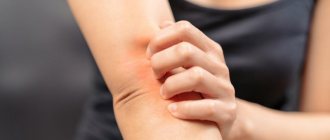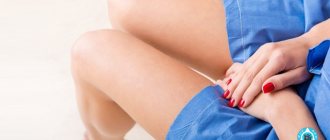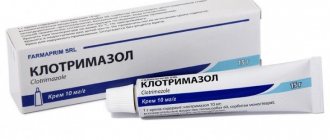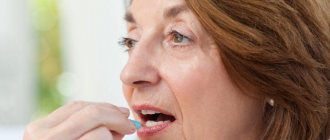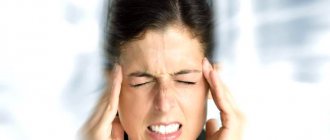Sex hormones estrogens have a wide range of biological effects on the entire female body. However, most of all they affect the genitals and urogenital system. Vaginal dryness during menopause is a common sign of a lack of estrogen hormones and age-related changes in the mucous membrane of the genital organ. This unpleasant symptom must be discussed with a gynecologist and measures taken to eliminate it.
If left untreated, vaginal dryness can cause serious ailments and complications from the genitourinary system.
What are the signs of vaginal dryness during menopause?
Symptoms of intimate dryness can appear completely unexpectedly and are very unpleasant:
- burning, itching of the labia minora, the entrance to the vagina and the organ itself;
- the same manifestations at the entrance to the urethra;
- tightness of the mucous membrane is felt;
- bleeding mucous membrane;
- painful sensation during sexual activity.
Hormone replacement therapy
The method of hormone replacement therapy (HRT) effectively helps to remove unpleasant symptoms caused by hormonal imbalance during menopause. Hormonal medications are prescribed for women with severe menopausal syndrome, as well as for the prevention of atrophic and age-related pathologies.
The action of hormonal drugs is focused on replacing missing hormones with synthetic analogues.
There are drugs in various combinations of estrogen with progesterone or androgens, as well as mono-estrogenic drugs.
To restore the level of moisture in the vagina during menopause, the following types of medications can be prescribed:
- Suppositories with estrogen during menopause. Aimed at restoring the acid-base balance and eliminating discomfort. They can also be prescribed to combat pathogenic microflora or infectious processes.
- Drugs in tablet form. These can be antimenopausal drugs of general action or with a contraceptive effect (until the menstrual cycles have stopped). The effect on the amount of discharge in this case is secondary; the dryness will go away after the estrogen balance is restored.
- Hormonal ring. Inserted into the vagina for a period of 1 to 3 months. The product allows you to replenish estrogen levels by absorbing the hormone released by the ring into the vaginal walls.
- Gels and creams with estrogen. The drugs are introduced into the vagina using an applicator and have a rapid local effect. The discomfort goes away within a few hours. Treatment with hormonal cream helps get rid of dryness in the intimate area in postmenopause.
There are certain contraindications to the use of hormone replacement medications:
- oncological diseases;
- thrombosis and thromboembolism;
- liver and kidney diseases;
- vaginal bleeding;
- ovarian endometriosis;
- mastopathy.
If there are contraindications to the use of hormones, the patient may be offered an alternative in the form of homeopathy based on phytoestrogens.
Phytoestrogens are plant substances that are structurally similar to natural estrogens. However, such drugs are not hormones, and their effectiveness does not have a sufficient evidence base. Contrary to this, many women note a general strengthening effect, elimination of hot flashes and vaginal dryness from taking phytohormonal medications.
From anatomy
The vulva is one of the components of the female system, which has quite a lot of purposes: for the movement of sperm into the uterus, for protecting the internal parts of the reproductive system. The vagina has a muscular structure; inside it there is a mucous membrane containing glands that produce a mucous substance of slightly acidic quality, which does not allow pathogenic microflora to penetrate the uterus. At a younger age, blood circulation in the epithelium is active: it saturates the mucous membranes with oxygen, renewing the tissues of the epithelium and glands.
When blood circulation is disrupted as the body withers, the mucous membranes dry out, become inelastic, thinner, are not lubricated, as before, with secretions, and the nerve endings in the epithelium are exposed.
As a result, dryness occurs in the intimate area during menopause. In medicine, this phenomenon is called atrophic, senile or senile colpitis or vaginitis.
Causes of discomfort during menopause
Menopause is accompanied by a gradual irreversible decrease in estrogens - female sex hormones primarily responsible for reproductive function. Their deficiency leads to a significant decrease in the thickness of the epithelium of the genital organs and loss of their elasticity. In addition, the secretory activity of the gonads and the production of collagen fibers, responsible for rapid tissue regeneration, are sharply reduced. All this causes discomfort in the intimate area, which usually begins in the perineum due to dryness and thinning of the labia majora and minora.
Itching and burning in the vagina without discharge is considered a manifestation of the so-called atrophic vulvovaginitis, and in the perineum - vulvovaginal atrophy. In themselves, these age-related changes do not pose a serious danger to women's health. However, scratching the pathological area and sexual intercourse without the use of additional lubricant can lead to long-healing cracks and erosions, which provoke infections and exacerbation of inflammatory diseases.
The development of the clinical picture does not occur instantly, but over several months or even years. In this case, itching of the genital organs during menopause is often episodic and is felt only after urination or sexual intercourse. But in some women, this symptom manifests itself in a very severe form and is accompanied by unbearable pain in the labia and perineum, sleep disturbances and mood swings.
Regardless of the intensity of discomfort in intimate areas, you should under no circumstances ignore the pathology, just as you should not self-medicate. If the first signs of atrophic changes are detected, you must immediately contact a gynecologist or gynecologist-endocrinologist to prescribe adequate therapy.
Why does the intimate area become dry?
Vaginal dryness is also possible in young ladies, but at Balzac’s age this trouble can indicate various problems within the body:
- a lot of stress during menopause, which affects many processes in the body, including dry mucous membranes;
- treatment with certain drugs (antidepressants, antibiotics, diuretics, antiallergic drugs) causes changes in vaginal secretions;
- such a bad habit as smoking, which imbues the entire body with various poisons;
- personal hygiene products with various chemical additives: dyes, flavors;
- wearing underwear made of artificial, synthetic fibers;
- lack of sex during menopause due to pain, leading to greater vaginal dryness, because lubricant is not released. This is superimposed on such a problem during menopause as a decrease in libido.
Complications of colpitis
Reduced levels of estrogen during menopause weaken a woman’s health and her immunity decreases.
If colpitis appears, if treatment is not taken, it can lead to the following manifestations:
- fungal diseases in the vagina and uterus - begin due to a change in the environment to alkaline, which is beneficial for pathogenic flora;
- urethral disease, thinning of the bladder walls, urinary incontinence, pain when urinating;
- erosions in the genital area;
- the appearance of headaches, lethargy, weakness of the body.
Analyzes
- Studies are not carried out regularly, but depending on specific results and possible differential diagnoses.
- Investigation for any postmenopausal vaginal bleeding is mandatory.
- A smear is done if there is vaginal discharge or vulvitis to rule out infection.
- If there are suspicious visible areas of epithelium, or there is no improvement with treatment, a vulvar biopsy may be required.
- Urine tests may be needed if symptoms are related to the bladder and urethra.
Hidden causes of vaginitis
Vaginal dryness during menopause can appear due to hidden diseases that can lurk inside the body for a long time without manifesting themselves.
Here is a list of diseases accompanied by dryness of the vulva:
- benign and malignant tumors;
- bacterial form of vaginosis;
- endometriosis of the uterus;
- fibroids in the uterus and cervix;
- diabetes;
- consequences of radiation or chemotherapy;
- genital herpes;
- venereal diseases;
- autoimmune diseases.
Dryness in the genital area is also present after removal of the female organs, leading to artificial menopause.
Itching during menopause treatment
With the onset of menopause, a woman’s hormonal background undergoes enormous changes that affect not only the reproductive system, but also affect the functioning of the entire body. One of the most unpleasant manifestations of menopause is itching and discomfort in the intimate area. If this symptom occurs, you should not let the situation take its course and postpone a visit to a specialist to rule out sexually transmitted infections and other diseases. Timely treatment of itching during menopause will not only relieve pain, but also avoid the possible severe consequences of atrophic changes in the genital organs.
Hygiene causes of dry vulva
It is not at all necessary that you have fallen ill with a terrible unknown illness if you experience discomfort inside the vagina. The reasons may be trivial:
- failure to comply with intimate hygiene rules;
- douching, which dries out even more;
- consequences of treatment with antibiotics, diuretics, and blood pressure-lowering tablets;
- allergies to laundry detergents, perfumed soaps, intimate hygiene gels;
- reduced blood flow in the area of the female organs;
- absent or rare sex life;
- tight underwear made from non-natural fabrics.
Some useful tips
- Modern pleasant-smelling shower gels and perfumed soaps are replete with harmful chemical additives that lead to irritation of the skin and mucous membranes; Moreover, they can lead to an allergic reaction. And since they have an alkaline composition, this can corrode the unprotected inner lining of the vulva or wash away the remnants of the protective secretion, and the path is open to infection. To maintain the acidic environment in the vagina, using regular moisturizing soap and toilet paper without dyes and fragrances for intimate hygiene will be a way to protect the microflora of the intimate area.
- Very tight underwear compresses the body and does not allow blood to freely saturate the genitals with oxygen. It is also better to sacrifice a beautiful look in synthetic lace thongs and buy cotton underwear, which is preferable for the health of the skin and mucous membranes.
- Lack of washing also gives pathogenic fungi and infections a chance to thrive in the vagina. A problem such as candidiasis may occur, accompanied by a bad odor from the intimate area, itching, burning, and discharge.
- Promiscuous sexual intercourse is dangerous at any age and can lead to problems with contracting sexually transmitted diseases and other infections. One sexual partner for life – safe sex. By the way, even the use of condoms used for protection does not save you from AIDS and hepatitis, since it has been proven that the size of viruses is much smaller than the microscopic holes in the latex of products.
- To wash the intimate area, you should not use facial wash foam and shower gel. The pH of the product should be neutral so as not to harm the vaginal microflora.
- During menopause, choose products for the intimate area with phytohormones, lactic acid, hyaluronic acid, aloe, panthenol, and extracts of soothing herbs. Check for the presence of allergens in the product.
- Do not use condoms with fragrances or a non-smooth surface, so as not to irritate the thinned epithelium.
- You should not count on the fact that the problem of dry intimate places will resolve on its own over time. You need to arm yourself with the knowledge of how to deal with this, understand that you need to learn to live with it until the end of your days. It is necessary to go to see a doctor to determine the causes of the discomfort: if necessary, take tests to exclude the occurrence of the disease and decide on the choice of means to eliminate dryness and burning.
Hormones to get rid of colpitis
Since during menopause there is a lack of estrogen in the female organs, the doctor may prescribe hormone replacement therapy to the patient.
It must be remembered that independent choice of means can be tragic for a woman, causing cancer or endometrial dysplasia. Do not rely on the choice of your friends or relatives: let your gynecologist prescribe the right medications. In hormone therapy, there is a fairly large selection of means to normalize the estrogen balance - vaginal hormonal rings, ointments, lubricants, suppositories, tablets:
- Dermestril , Klimara , Divigel gels is carried out using an applicator. Quickly relieve the feeling of dryness and moisturize, create elasticity of the vaginal epithelium.
- Installation of a hormonal ring is performed by a doctor. This product contains estrogen, which is gradually absorbed by the mucous membrane and eliminates the symptoms of colpitis for 1 to 3 months.
- The use of vaginal suppositories Ovestin , Oripoda - for two weeks relieves bad sensations inside the vagina.
- If there is a serious shortage of hormones, the gynecologist has the right to prescribe oral preparations of complex HRT (what is it) .
Can menopause cause itching?
Low estrogen levels can cause itchy skin
During menopause, a woman's estrogen levels begin to decline.
Estrogen is important for maintaining healthy skin. This hormone helps keep your skin hydrated by stimulating the production of natural oils and collagen. Collagen is a protein that provides strength and elasticity to the skin.
Decreased production of natural oils and collagen can lead to dry, thinning skin. Such changes are often accompanied by itching.
Hormonal suppositories
Intravaginal suppositories restore the mucous membrane of the intimate area and are not dangerous for women: they do not cause endometriosis and hormone-dependent tumors. In cases where a woman has contraindications to the use of drugs with estriol, phytosuppositories with herbal ingredients can be used.
The composition of the suppositories normalizes the state of lactobacterial microflora in the vagina and saturates the mucous membrane with hyaluronic acid.
Having carefully studied the composition and contraindications of these suppositories, a woman can make her own choice and purchase the following suppositories with herbal composition:
- Estrocad;
- Ovestin;
- Estriol;
- Orthogynest.
Epidemiology
According to medical statistics, during the first five years of menopause, you can lose up to 30% of the protein responsible for the health and elasticity of the epidermis. In postmenopausal women, this rate is about 2% per year. Collagen fibers form the framework of the skin. Between the fibers there is hyaluronic acid, which retains water, maintaining normal humidity. Estrogen deficiency leads to the fact that collagen fibers fuse, that is, tissues lose their firmness and elasticity. Estrogen deficiency leads to a decrease in the number of blood vessels and a decrease in oil production by the sebaceous glands.
Gels or lubricants
Gels are used to lubricate the inside of the vulva to relieve discomfort in the area.
Gels help only to relieve the symptoms of colpitis, without affecting a woman’s hormone levels. The composition of the gels is similar to the natural lubrication of the vagina; they are intended to eliminate the feeling of dryness and pain, especially during sexual intercourse. For a prolonged effect, the gels contain synthetic hormones with lactic acid and chlorhexidine. Gels are used before bedtime, for symptoms of colpitis, and the dose of the substance introduced into the organ is gradually reduced over time. The following gels are popularly used:
- Divigel;
- Dermestril;
- Ovestin;
- Klimars.
Phytohormonal therapy for vaginal dryness
Many natural remedies have been developed to combat atrophic colpitis. Please note the following forms:
- the use of Cyclodinone, Klimadinon Uno, Cyclim with phytohormones stimulates the body's production of estrogens;
- the use of vitamins A and E normalizes the health of the mucous membrane;
- vaginal suppositories Vagikal with calendula remove burning, itching, promote the healing of wounds and cracks;
- the use of Feminela and Cicatridine suppositories guarantees the removal of vulvar dryness for a long time; hyaluronic acid, aloe extract, calendula in their composition will help with this;
- the use of Ginocomfort, Ginofit, Monavita gels is intended to remove the symptoms of vaginitis, normalize the acidity of the vaginal flora, protecting against infection, use before sexual intercourse is desirable during menopause;
- Bliss in gel form also relieves signs of colpitis and restores lubrication of the vulva, hypoallergenic, moisturizing, heals vaginal microtraumas;
- The use of gel-based Vagilak and suppositories under the same name is popular among women during menopause; they contain lactic acid. The product normalizes the lactoflora of the vulva, removes all unpleasant sensations, and does not allow bacterial vaginosis to recur;
- purchasing Lactacid for the treatment of vaginitis will help to have a gentle effect on the mucous membranes and restore their health.
As long as you maintain hygiene and a properly balanced diet with Omega-3 acid, you will be able to overcome vaginal dryness, but you should be reminded that you need to be treated under the supervision of a gynecologist.
Diagnosis and treatment of the problem
To protect yourself from discomfort and unpleasant sensations, you need to visit a gynecologist.
Together with your doctor, you can determine the cause of the problem, the degree of its development and select the best treatment methods.
The list of diagnostic procedures includes:
- conversation with a doctor to collect anamnesis;
- examination in a gynecological chair;
- smear to examine microflora;
- cytological examination;
- colposcopy;
- general blood analysis;
- blood test for hormones;
- transvaginal ultrasound;
- Ultrasound of the pelvic organs.
Treatment will be prescribed according to the results of a comprehensive study.
In the early stages of menopause, dryness and discomfort can be eliminated with the help of a healthy diet, an active lifestyle, regular sex life, and vitamin-mineral complexes containing vitamin E and A.
Lubricants will help restore the pleasure of sex, and you can eliminate cracks and microtraumas by using candles with healing plant extracts. The main thing is to follow the doctor’s recommendations and not self-medicate.
With the onset of menopause, the diagnostic picture becomes more complex, since natural estrogen is practically absent in the body. At this stage, you can still use non-hormonal gels, creams and vaginal suppositories for dryness during menopause, but they will not have a long-term effect.
The problem of menopausal vaginal dryness is the thinning of the organ’s mucosa due to estrogen deficiency, and therefore for a pronounced effect it is worth using hormonal-based products or with herbal hormone substitutes.
Traditional methods for vaginal dryness
What else can you do for vaginal dryness besides using medications? The use of herbs, douching, and herbal baths is not superfluous in the treatment of dryness in the intimate area during menopause.
Using herbal decoctions, you don’t have to worry about side effects and allergies. Folk remedies for all manifestations of menopause have always been and will be a priority for the weaker sex.
It is possible to use decoctions both orally and for irrigation of the genitals; the composition is identical in both cases:
- Take sixty grams of nettle, twenty grams of oregano, thirty grams of calendula, fifty grams of chamomile and speedwell. Boil for five minutes in half a liter of water, add when it is boiling. Take half a glass every day for up to two weeks.
- Borovaya uterus and motherwort are excellent herbs for women's health. Pour one hundred grams of the mixture into 2 cups of boiling water and leave, take a third of a glass three times a day before meals.
- You can douche the vagina by boiling calendula, but no more than five times in one course of treatment, so as not to damage the microflora of the vulva.
- You can wash yourself with a diluted decoction of chamomile, string or boron uterus.
- Baths with motherwort can help relax the nervous system and relieve signs of vaginitis. Pour sixty grams of motherwort into two glasses of hot water and boil for two to three minutes. Leave for 30 minutes, strain and add to the bath. The procedure is carried out once every 7 days.
- There is an extreme way to saturate the vulva with vitamin E: take a sterile bandage, make a tampon out of it, dip it in a mixture of 1 ampoule of a liquid oil solution of the vitamin with boiled refined sunflower oil in a volume of 50 ml, insert it into the vagina for five minutes. You can use this mixture to lubricate the mucous membrane until vaginal dryness goes away.
Instead of lubricating gels, it is recommended to use natural oils:
- olive;
- calendula.
If you take your health seriously and regularly use the chosen products, the mucosal tissues are restored, moisturized, rejuvenated, and cracks heal.
How to get rid
Menopause is a natural process of attenuation of the reproductive function of the female body. But sometimes its manifestations are so painful that they require treatment. Sometimes women, having discovered unwanted symptoms, do not associate them with menopause. There are ladies who are embarrassed to talk about this at an appointment with a gynecologist.
If you notice the negative phenomena listed above, consult a doctor. You should not deliberately reduce the quality of your life. The negative effects of menopause should be treated.
Treatment with hormonal drugs
To treat the negative consequences of menopause, hormonal drugs are prescribed.
They are aimed at increasing the level of female hormones in the blood:
- Ortho-ginest. Suppositories help restore the vaginal microflora.
- Ovestin. Used in the form of tablets and suppositories. Vaginal suppositories help improve the mucous membranes of the genital organs.
- Estrocad. The drug in the form of suppositories has a stimulating effect on the secretory function of the vagina.
All hormonal drugs contain estradiol. This substance stimulates the production of estrogen.
Phytoestrogens
A woman does not always tolerate hormones. In these cases, she is prescribed medications that do not contain hormonal components.
Feminal is based on red clover herb extract. This plant contains isoflavones - phytohormones similar to natural estrogen. They interact with estrogens contained in various tissues of the body:
- bone and fatty tissues;
- cardiovascular system;
- hypothalamus.
By activating the action of estrogens, phytohormones prevent the manifestations of menopause. Non-hormonal suppositories include Vagikal. The main component of the medicine is calendula. Suppositories help relieve inflammation and eliminate itching. Vaginal suppositories are inserted into the vagina once a day before bed. The course of treatment lasts from 10 to 14 days.
Clinical trials have been conducted, during which it has been proven that herbal preparations alleviate the symptoms of menopausal syndrome. One of the effective remedies is an extract from cohosh rhizomes. A drug based on it - Klimadinon (source - scientific article "The influence of black cohosh (Cimicifuga racemosa) on metabolism in bone tissue, the condition of the vaginal mucosa and various parameters of blood tests in postmenopausal women", authors - V. Wuttke, K. Gorkov, D Seidlova-Wuttke).
Ointments and gels
For vaginal dryness, ointments and gels are prescribed. The most commonly used:
- Klimara;
- Divigel;
- Dermestril.
Gels and ointments are used before going to bed. The product is applied to the applicator and inserted into the vagina. The drug placed inside is heated by body temperature. The heated substance envelops the walls of the vagina, penetrates the mucous membrane, moisturizing it. Moisturizing oils operate on the same principle and are also used to compensate for the loss of estrogen.
Continuing intimate life after menopause helps improve women's health. Regular sex stimulates the production of natural lubrication. If this is not enough, then lubricants are used - special substances that facilitate friction. Based on natural and synthetic waxes, they moisturize the mucous membrane, prevent the appearance of cracks, helping to normalize sexual life.
Important! You don’t need to choose medications on your own to help overcome the effects of menopause. You should contact a gynecologist and tell about your problem. The doctor will help you choose the right remedy.
We recommend reading the article about insomnia during menopause. From it you will learn about the causes of sleep disturbances, symptoms and possible consequences, what to do and how to treat insomnia during menopause, recommended medications and the effectiveness of traditional medicine.
And here is more information about swelling during menopause.
Nutrition
A diet will help combat dry skin and mucous membranes. You should reconsider your attitude towards food. It should be varied and useful. Split meals are encouraged: 5–6 times a day in small portions.
Cookies and sweets should be replaced with fresh and dried fruits. When preparing second courses, give preference to seafood and vegetables. You need to stop drinking coffee and alcoholic beverages. This will reduce the sequence of tides.
Drinking plenty of fluids will help compensate for the lack of moisture. You should take as a basis in the first half of the day to drink a glass of clean still water every hour. Water has other positive effects. It stimulates metabolism and helps control weight.
Recommendations for nuances in nutrition
Streamlining your lifestyle and diet are also important for treating atrophic vaginitis during menopause, as is medication. Doctors' recommendations are as follows:
- drink at least two liters of clean water a day to saturate your body cells with moisture and remove toxins;
- decoctions of licorice root, arnica, sage, linden, hops, ginseng, chamomile are plant sources of estrogens, so necessary for menopause;
- Eating dishes from pumpkin, tomatoes, eggplants, carrots, cabbage, and various legumes will also fill the diet with female hormones. By the way, lentils contain serotonin, a source of good mood, which is very necessary for women during menopausal emotional breakdowns;
- non-fat dairy products are very important in the diet of women;
- marine oily fish and seafood should be eaten regularly for women's health;
- cereal products, porridges;
- regular consumption of seeds, nuts, apricots, dried apricots, dates;
- eat mushrooms;
- Among fruits, it is most preferable to eat pomegranates to replenish the body with estrogen;
- I would especially like to say about flaxseed: among other products it has the largest amount of hormones; to normalize hormonal levels you need to take only 2 large spoons of seeds;
- It is recommended to limit the intake of spicy, salty, alcohol and coffee, which irritate the mucous membranes of the body.
Dear women, take care of your health, do not give up on the symptoms of dryness and burning in the female organs, visit a gynecologist in a timely manner. Be happy!
Educational video on this topic:


